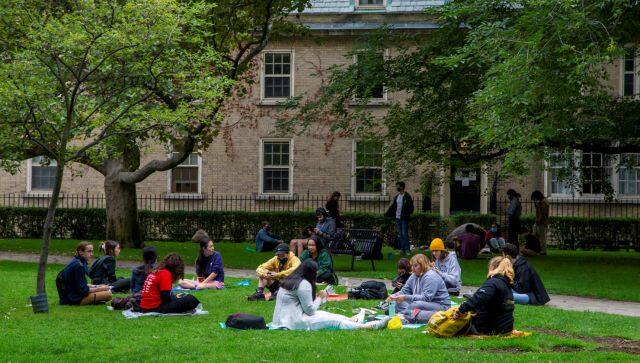The UK has changed its rules from Monday. Prime Minister Rishi Sunak said that a majority of international students can no longer bring their families to the UK.
Sunak has been under mounting pressure from the right-wing of the Conservative Party to cut immigration. The UK government had last year under then home secretary Suella Braverman announced changes to the immigration rules for overseas students. “Our world-leading universities rightly attract some of the brightest students from around the world to the UK. But we have seen a surge in the number of dependants being brought by students, which is contributing to unsustainable levels of migration,” said UK Minister for Legal Migration and the Border Tom Pursglove on Monday. “We are completely committed to seeing a decisive cut in migration. The action implemented today to restrict bringing dependants on the student visa route allows us to better protect our public services while supporting the economy by allowing the students who contribute the most to keep coming here. This is part of a series of measures which together will see 300,000 fewer people coming to the UK compared to last year,” he said. But what are the changes? And how will the rules affect Indians? Let’s take a closer look: What are the changes? As per Sky News, international students can no longer bring dependants to the UK – except if they are doing postgraduate research courses or courses with government-funded scholarships. As per Indian Express, students also can only change from the student visa to the work route after they’ve completed their studies. The government claims the rules will stop at least 140,000 people coming to the UK every year.
It said the changes would “prevent misuse of the visa system”.
The tougher rules are geared towards cutting what Home Secretary James Cleverly dubbed as an “unreasonable practice” of overseas students bringing dependants, which official figures show have risen by more than 930 per cent since 2019. “This government is delivering on its commitment to the British public to cut migration. We have set out a tough plan to rapidly bring numbers down, control our borders and prevent people from manipulating our immigration system, which will come into force throughout this year,” Cleverly said in a statement. “Today, a major part of that plan comes into effect, ending the unreasonable practice of overseas students bringing their family members to the UK. This will see migration falling rapidly by the tens of thousands and contribute to our overall strategy to prevent 300,000 people from coming to the UK," he said. How will the rules affect Indians? It will certainly make things more difficult. Ironically, the development comes as the UK was becoming a more popular destination for Indian students – and their families. [caption id=“attachment_13147542” align=“alignnone” width=“640”] International students can no longer bring dependants to the UK – except if they are doing postgraduate research courses or are on government-funded scholarships. Reuters[/caption] India Today quoted study abroad platform Gradding founder Mamta Shekhawat as saying the UK’s ‘value for money’ – especially compared with the US and Australia – makes it an attractive destination. The outlet quoted research by Gradding as showing that the UK issued nearly 500,000 sponsored study visas in 2023 – almost a third of these to Indian students.
International students can no longer bring dependants to the UK – except if they are doing postgraduate research courses or are on government-funded scholarships. Reuters[/caption] India Today quoted study abroad platform Gradding founder Mamta Shekhawat as saying the UK’s ‘value for money’ – especially compared with the US and Australia – makes it an attractive destination. The outlet quoted research by Gradding as showing that the UK issued nearly 500,000 sponsored study visas in 2023 – almost a third of these to Indian students.
Indian students received 142,848 sponsored study visas in 2023 – a 54 per cent rise compared to 2022.
Indian students now have almost seven times the number of study visas that they had in 2019. Around 3 lakh Indian students are set to enrol in UK universities in the upcoming academic year, as per India Today. According to the UK’s Office for National Statistics (ONS), 152,980 visas were given to dependants of students till September 2023. That figure was at 14,839 in September 2019. As per Indian Express, 139,700 Indian students went to the UK for higher education in 2022-2023. Postgraduate studies have been a favourite of students since 2019-2020. Around 74 per cent of all international students went to the UK for postgraduate studies in 2022-23 compared to 65 per cent in 2019-20. The data also showed Indians favour a one-year Master’s degree – as it allows them to bring their family or spouse to the UK. Meanwhile, the Graduate immigration route – which international students, who have finished a degree at undergraduate level or above can apply for – witnessed 42 per cent of extensions granted to Indian students. Indian nationals represent the largest group of students granted leave to remain on this route – aka post-study work visa. The route allows international students who have finished their degree to remain in the UK and work or look for jobs at any skill level for two years. It gives doctoral students three years to work or look for jobs. As per India Today, 20 per cent of students whose visas expired in 2022 chose this route. However, the UK government looks as if it will cut off this path as well. It announced that the independent Migration Advisory Committee (MAC) will be commissioned to review the Graduate route. “This package of measures, taken in addition to the measures on student dependants, means that around 300,000 people who came to the UK last year would not be able to in the future – the largest reduction ever. This is a tough but fair approach to bring net migration down to sustainable levels as soon as possible, while ensuring those affected have ample time to prepare for upcoming changes – with the package being introduced gradually throughout early 2024,” the Home Office said. Students and experts worried But diaspora student groups have expressed widespread concerns over this proposed review of the route, which allows for post-study work experience and is the topmost factor behind students from India choosing UK universities. Pragyan, a student from India, told The Guardian that he’d just finished his Master’s degree in project management. “I have invested nearly £40,000 in education, accommodation, visa and health insurance,” Pragyan, who also has a Bachelor’s degree in electrical and electronics engineering, said. “Because the economy is in such a poor condition, there are hardly any companies [willing to sponsor work visas]. Now that the government has increased the rate to a whopping £38,700 to qualify for a visa, it will be impossible for many international graduates to secure a job. “The new [policies] will separate families, make people lose hard-earned money, and could lead to a future lack of trust in any upcoming government inviting legal immigrants to work or study in the UK. I am deeply distressed, disappointed and worried for my future.” [caption id=“attachment_13481372” align=“alignnone” width=“640”] Students also can only change from the student visa to the work route after they’ve completed their studies. Representational image.[/caption] “The recent changes in UK visa regulations have prompted me to carefully consider potential impacts on my academic and professional journey. The heightened measures raise concerns about securing employment opportunities post-graduation and the overall feasibility of pursuing a career in the UK. Additionally, the stringent visa processes and immigration policies will influence my decision to pursue higher education in the UK,” a Mumbai student enrolled at the University of Edinburgh told Indian Express. “I am now prompted to look at neighbouring countries to undertake my PhD. These measures not only influence my immediate decisions about studying abroad but also shape my long-term strategies for establishing a career in the evolving landscape of the UK job market.” The Indian Express quoted Lord Karan Bilimoria, Chancellor, University of Birmingham, as warning that the UK would “lose out on many high-quality Master’s students. “So for example, the Dean of the London Business School wrote to me because I’m president of the UK Council of International Student Affairs. I’m also the co-chair of the old party parliamentary group on international students. And as an alumnus of the London Business School, he wrote a letter with the fact saying, do you realize it’s a huge proportion of our students who bring over dependents — and this is one of the top business schools in the world – And if they cannot bring dependents, we will lose the students,” Bilimoria said.
Students also can only change from the student visa to the work route after they’ve completed their studies. Representational image.[/caption] “The recent changes in UK visa regulations have prompted me to carefully consider potential impacts on my academic and professional journey. The heightened measures raise concerns about securing employment opportunities post-graduation and the overall feasibility of pursuing a career in the UK. Additionally, the stringent visa processes and immigration policies will influence my decision to pursue higher education in the UK,” a Mumbai student enrolled at the University of Edinburgh told Indian Express. “I am now prompted to look at neighbouring countries to undertake my PhD. These measures not only influence my immediate decisions about studying abroad but also shape my long-term strategies for establishing a career in the evolving landscape of the UK job market.” The Indian Express quoted Lord Karan Bilimoria, Chancellor, University of Birmingham, as warning that the UK would “lose out on many high-quality Master’s students. “So for example, the Dean of the London Business School wrote to me because I’m president of the UK Council of International Student Affairs. I’m also the co-chair of the old party parliamentary group on international students. And as an alumnus of the London Business School, he wrote a letter with the fact saying, do you realize it’s a huge proportion of our students who bring over dependents — and this is one of the top business schools in the world – And if they cannot bring dependents, we will lose the students,” Bilimoria said.
Experts also warned of a negative mental health impact on students.
Impact Shorts
More Shorts“For some, it may lead to increased financial burden as they would need to find alternative childcare arrangements or pay for their dependents to return to India, which could put a strain on their finances. It could also lead to emotional isolation as those students who are not able to bring their families with them may feel lonely and isolated, which could negatively impact their mental health and well-being,” Mayank Maheswari, COO of University Living, a global student housing platform, told the newspaper. The Home Office said the changes to student visas strike the “right balance” to continue to preserve the attractiveness of the UK’s world-leading higher education sector while removing the ability for institutions to undermine the UK’s reputation by “selling immigration, not education”. It said the government will work with universities to design an “alternative approach” for the brightest and the best to bring dependants to the UK’s world-leading universities while continuing to reduce net migration. Last month, Cleverly announced a further set of measures including tightening health and care visas by stopping overseas care workers from bringing dependants and requiring care firms in England to be regulated by the Care Quality Commission to sponsor visas. Salary thresholds across the Skilled Worker route will also be increased by nearly 50 per cent to £38,700, a figure to be matched for British or permanent UK residents sponsoring family members to join them in the UK by early next year. With inputs from agencies
)